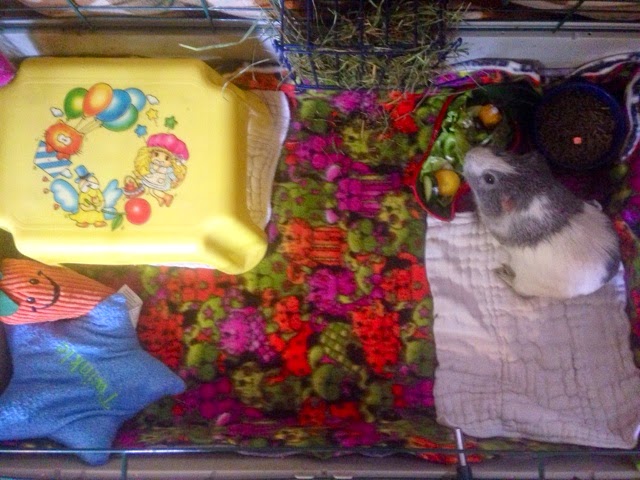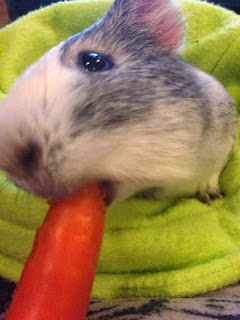So you already know that are usually happiest with a companion of the same sex and you're ready to adopt another.... Now what?
First, quarantine your new guinea pig away from any other guinea pigs for at least two weeks. Bringing home a new guinea pig greatly increases the risk of your existing guinea pigs getting sick. You need a couple weeks to observe the new guinea pig for itching, sneezing, weight loss, or any other odd behaviors that could indicate respiratory infection, lice, mites, or another illness.
Here are tips for the best method of success:
#1. Do not just take a guinea pig and place it in your resident pig's home, because it will be seen as an intruder. Your guinea pig is likely to be alarmed and take action. The new guinea pig will be on the defensive and fight back. The key is to move slowly with introductions.
#2. Introduce the guinea pigs on neutral ground with many goodies and hiding spots - cardboard boxes work great. This makes the meeting a pleasurable experience and helps them feel safe. When it's time to introduce the new guinea pig to the shared cage for the first time, have it freshly cleaned, rearranged, and put in some new fun stuff to change it up.
#3. Bathing both guinea pigs first so they smell the same can help.
#4. Rumbling and swaying is natural. They're going to sniff each other. They may mount each other to compete for dominance.
 |
| Here Dan shows Chance his rumble strut. |
#5. Monitor them closely with a towel, but leave them be unless fighting is serious. If fighting becomes serious and there is blood shed or hair flying, throw the towel in and grab one immediately. If there is not blood drawn, let them squeal, chase, and work out their piggy hierarchy. They will compete to determine who's the leader and who's the follower. It's natural; you only want to step in if there's serious fighting.
#6. Introducing a younger pig is likely to go better than adding an older one. A baby guinea pig is likely to accept the other pig as a leader much more quickly. Two older pigs are likely to work out their differences more harshly. Two "teenager" guinea pigs guinea pigs on the brink of adulthood are more likely to be hormonal and aggressive temporarily.
#7. Be patient. The payoff is very much worth it. I introduced all three of my boys one at a time when all were over a year old. Success is very possible.
It is important to say that all guinea pigs are individuals. They have their own personalities. Everything I am saying here is a generalization to the majority of guinea pigs. There will always be an exception here and there, so be prepared to take the time to find another loving solo-pig home, or keep another cage on hand for the long term if this does not work out.
Here are links that you may also find useful for your new guinea pig(s)-
Why where you put the cage matters:
http://guineapigscavyclub.blogspot.com/2014/02/making-guinea-pig-part-of-family.html
Consider these easy DIY accessories when rearranging your cage for a new introduction:
http://guineapigscavyclub.blogspot.com/2014/02/easy-affordable-and-fun-cage-accessories.html
http://guineapigscavyclub.blogspot.com/2014/02/easy-affordable-and-fun-cage-accessories.html
Taming and bonding with your guinea pigs:
http://guineapigscavyclub.blogspot.com/2014/03/guinea-pigs-taming-and-bonding.html
Pellets and Hay:
http://guineapigscavyclub.blogspot.com/2014/02/about-pellets-and-hay-how-to-choose.html
Keeping your guinea pigs healthy:
http://guineapigscavyclub.blogspot.com/2014/02/your-guinea-pigs-health.html
Vegetable and fruit list for guinea pigs:
http://guineapigscavyclub.blogspot.com/2014/04/vegetable-and-fruit-list-for-guinea-pigs.html
Why I recommend adopting not shopping for your new guinea pig:
http://guineapigscavyclub.blogspot.com/2014/02/march-is-adopt-rescued-guinea-pig-month.html
http://guineapigscavyclub.blogspot.com/2014/02/march-is-adopt-rescued-guinea-pig-month.html
Keeping you and your guinea pigs healthy - avoid sharing illnesses:
http://guineapigscavyclub.blogspot.com/2014/05/zoonotic-diseases-transmission-of.html






















